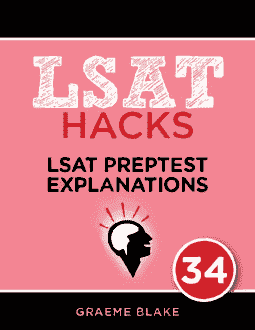QUESTION TEXT: People's political behavior frequently does not match…
QUESTION TYPE: Role in Argument
CONCLUSION: Voters often reelect politicians whose behavior they dislike.
REASONING: A lot of voters say they don’t like government intervention. But then they don’t reelect inactive politicians. But an active politician is one who supports a lot of intervention.
ANALYSIS: This is a good argument. If voters truly wanted to stop intervention then they should elect the laziest politicians they can find.
The claim that voters tend not to reelect inactive politicians is just a premise that supports the conclusion. It is an example of how people vote.
___________
- We don’t actually know why voters don’t reelect inactive politicians.
- CORRECT. It’s just a simple premise supporting the conclusion.
- It is the next sentence that describes a politician’s activity. The phrase in the question stem is about inactivity.
- This describes the first sentence.
- The argument does not say that people’s beliefs never match their behavior. That’s pretty extreme.


@Akiyahb
I think you made a strong case about “the conclusion…” and “main conclusion”.
One other explanation that is in my head is “political behavior” & “rhetoric”, the two very vague words. Not sure how election and politician could explain it, but a mere suspicion. I think you nailed it though.
The claim that voters tend not to reelect inactive politicians is just a premise that supports the conclusion. It is an example of how they people vote.
I think “they” should be “the”
Just wanted to lend a helping hand! :)
Wonderfully put together and insightful website!
Thanks, fixed it.
Eh. The whole main conclusion/sub conclusion thing isn’t as important as people make it out to be. I’ve literally seen ZERO examples of questions where it’s actually been tested.
Meaning that I’ve never seen two answers that were identically in terms of strength but one said main conclusion. Whenever an answer has had subsidiary conclusion in it, it’s always been possible to choose/eliminate it for other reasons.
In this case, there are two ways to read the argument:
1. The author is illustrating the first sentence in order to prove it. Therefore the first sentence is the main conclusion.
2. The final sentence is the conclusion. The first sentence is a premise that prepares us for the final conclusion and adds support to the idea that it’s possible.
I don’t think it matters. The proper view of the argument is that both are true, and it doesn’t matter. The LSAT simply isn’t testing which one is the main conclusion in technical terms.
My own theory for why the LSAT says subsidiary conclusion is twofold:
i. It’s a scary word, and makes some people panic and stop trying.
ii. It’s a response to people who overprep. A certain percentage of LSAT students will waste a lot of time trying to figure out subsidiary conclusions, when really it’s a red herring.
Here’s all you need to know: A subsidiary conclusion gets support from some other statement, and support a further conclusion. And you never need to get technical.
If anyone’s got an example of a question where more info than that is required, I’d be interested to see it. I get asked about subsidiary conclusions a lot, but I’m pretty convinced they’re unimportant.
Doesnt this arg have two conclusion? Sub: Voters often reelect politicians whose behavior they dislike. Main: People’s political behavior frequently does not match their rhetoric? Albeit, this has no real bearing on the answer choice – because (B) states it’s a premise offered in support for the conclusion NOT in support of the MAIN conclusion – leaving room for the premise indeed to be in support of the SUB conclusion.. I would like clarification as you stated the conclusion above as being what I ID’ed to be solely the SUB conclusion and not the overall ARG conclusion..